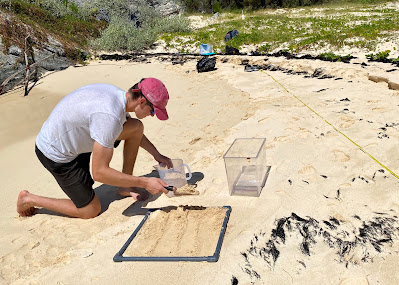Welcome back!
Here are interviews with three more of the 2020 Ocean Academy interns:
 |
| Photo credit: Imogen Peckett. |
Caroline Alexander, 20, is a rising third year undergraduate in geography at the University of Bristol (England). She is a first year Ocean Academy intern who is working with Shane Antonition, a former Bermuda Program intern who completed his masters dissertation on microplastics, to observe the microplastics on Bermuda's beaches. Microplastics, generally defined as plastic fragments 5mm or less in length, often result from the breakdown of consumer products and industrial waste and are a significant source of plastic waste on Bermuda's beaches. She hopes to use this internship as a source of research for her third year research dissertation.
What has your BIOS internship been like so far?
It’s been really good. We’ve collected samples from a few beaches and separated them by density. Then we've used size-fractionation [a separation process where a mixture is divided into smaller quantities that have different compositions] to sort the microplastics by size.
Has anything in particular impressed you while you have been at BIOS?
The views on the campus that I see while eating lunch are beautiful! I drive over the Causeway every day, and I get really excited to come to work when looking over at BIOS. I'm also impressed by how welcoming BIOS has been, even from the beginning. I usually feel nervous doing interviews, but when being recruited for this I wasn't scared at all.
Has your time at BIOS changed your thoughts on what you might want to do in the future?
Toward the end of my school year I found out I was doing this internship and it changed how I thought about my future. I already knew I wanted to do something with the environment, but I wanted to participate in this internship to see whether the practical side of science is something I'm interested in.
 |
| Photo credit: Imogen Peckett. |
Amber Wolffe, 27, is a rising fourth year undergraduate student in meteorology and mathematics at Metropolitan State University in Denver (U.S.). She was a 2015 Bermuda Program intern and this year she completed an eight-week joint internship with BIOS and the Bermuda Weather Service (BWS), a section of the Bermuda Airport Authority. She worked with Mark Guishard, director of the BWS, and BIOS adjunct faculty whose research focuses on the variability of Atlantic hurricane risk, Bermuda’s weather and climate, and local disaster risk reduction. Her internship focused on the effect of wind shear—changes in wind speed or direction over short distances—on aircraft approach at the L.F. Wade International Airport in Bermuda.
What has your BIOS internship been like so far?
It was a bit challenging in the beginning to do a virtual internship because of the COVID-19 pandemic. I missed the in-person aspect that I had experienced at BIOS in 2015, but this did help me to figure things out on my own and be more independent.
Has anything in particular impressed you while you have been at BIOS?
The fact that every time I reach out to the BIOS team they’re very accommodating. They make the process really easy and make you feel very welcome.
What would you say to other young people considering an internship at BIOS in the future?
The sky's the limit! Spread your wings and experience the endless possibilities that await you.
When you think about your internship here, what is a memorable experience that comes to mind?
In 2015, the most memorable experience for me was tagging along with a visiting group. I was able to sit in on a lot of meetings they had with corporate businesses. That was my introduction to the corporate aspect of my future, which gave me some perspective on what different options I had with my degree.
Has your time at BIOS changed your thoughts on what you might want to do in the future?
Absolutely! I have realized that I have more of a knack for performing research and I actually like it. This has led me to pursue a second degree.
 |
Photo credit: Imogen Peckett. |
William Welch, 18, is a rising freshman in mechanical engineering at the University of Waterloo (Canada). In 2019 he worked as a BIOS volunteer intern with Alex Hunter [former dive safety officer and small boats manager at BIOS] on dive boats. This year he worked with Shane Antonition, a former Bermuda Program intern who completed his masters dissertation on microplastics and Kaitlin Noyes, director of education and community engagement at BIOS. His internship focused on observing the sizes and amounts of microplastics on Bermuda's coastlines, and supporting BIOS in the beta testing of low-cost microscope photography for the creation of a digital plankton library called Planktos.
What has your BIOS internship been like so far?
A lot of work and a lot of fun. I've learned a huge amount about microplastics and just how many there are on Bermuda's beaches. I've also learned a lot about plankton and started to think of them differently after seeing them close-up.
Has anything in particular impressed you while you have been at BIOS?
It's impressive how focused the staff and interns are on conducting research to help the environment. Everyone is so dedicated! I'm interested in working with the environment, but my degree might take me away from it for some time. Seeing the activities at BIOS before starting my freshman year has meant I'll be keeping environmental causes at the front of my mind during my degree.
If you could sum up your internship in five words, what would they be?
Educational, fun, challenging, environmental, and friendly.
Has your time at BIOS changed your thoughts on what you might want to do in the future?
Yes, somewhat. I'm still excited to start with mechanical engineering, but I think I'd like to go down a more environmental path once I have that degree.
No comments:
Post a Comment